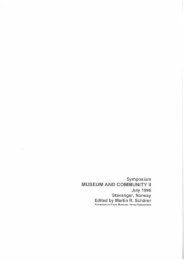Key Concepts of Museology - ICOM
Key Concepts of Museology - ICOM
Key Concepts of Museology - ICOM
You also want an ePaper? Increase the reach of your titles
YUMPU automatically turns print PDFs into web optimized ePapers that Google loves.
56<br />
because it includes all the others,<br />
museology covers a much wider fi eld<br />
comprising all the efforts at theorisation<br />
and critical thinking about<br />
the museal fi eld. In other words,<br />
the common denominator <strong>of</strong> this<br />
fi eld could be defi ned as a specifi c<br />
relation between man and reality,<br />
which is expressed by documenting<br />
that which is real and can be grasped<br />
through direct sensory contact. This<br />
defi nition does not reject a priori any<br />
form <strong>of</strong> museum, including the oldest<br />
(Quiccheberg) and the most recent<br />
(cyber museums), because it tends to<br />
concern itself with a domain which<br />
is freely open to all experiments in<br />
the museal fi eld. Nor is it limited to<br />
people who call themselves museologists.<br />
We should note that if some<br />
protagonists have made museology<br />
their fi eld <strong>of</strong> choice, to the point <strong>of</strong><br />
presenting themselves as museologists,<br />
others tied to their pr<strong>of</strong>essional<br />
branch who only approach the<br />
museal sphere on occasion prefer to<br />
keep a certain distance from “museologists”,<br />
even though they have, or<br />
have had, a fundamental infl uence<br />
in the development <strong>of</strong> this fi eld <strong>of</strong><br />
study (Bourdieu, Baudrillard, Dagognet,<br />
Debray, Foucault, Haskell,<br />
McLuhan, Nora or Pomian). The<br />
guidelines in a map <strong>of</strong> the museal<br />
fi eld can be traced in two different<br />
directions: either with reference to<br />
the main functions inherent to the<br />
fi eld (documentation, collecting,<br />
display and safeguarding, research,<br />
communication), or by considering<br />
the different branches <strong>of</strong> knowledge<br />
which examine museology from time<br />
to time.<br />
With this last view in mind, Bernard<br />
Deloche proposed defi ning<br />
museology as museal philosophy.<br />
“<strong>Museology</strong> is the philosophy <strong>of</strong> the<br />
museal fi eld which has two tasks:<br />
(1) it serves as metatheory for the<br />
science <strong>of</strong> intuitive concrete documentation,<br />
(2) it provides regulating<br />
ethics for all institutions responsible<br />
for managing the intuitive concrete<br />
documentary function” (Deloche,<br />
2001).<br />
DERIVATIVES: MUSEOLOGICAL, MUSEOLOGIST.<br />
CORRELATED: MUSEAL, MUSEALIA MUSEALITY,<br />
MUSEALISATION, MUSEALIZE, MUSEOGRAPHY,<br />
MUSEUM, MUSEUM OBJECT, NEW MUSEOLOGY,<br />
REALITY.<br />
MUSEUM<br />
n. (from the Greek mouseion, temple <strong>of</strong> the<br />
muses). – Equivalent in French: musée; Spanish:<br />
museo; German: Museum; Italian: museo;<br />
Portuguese: museu.<br />
The term ‘museum’ may mean either<br />
the institution or the establishment<br />
or the place generally designed to<br />
select, study and display the material<br />
and intangible evidence <strong>of</strong> man and<br />
his environment. The form and the<br />
functions <strong>of</strong> museums have varied<br />
considerably over the centuries.<br />
Their contents have diversifi ed, as<br />
have their mission, their way <strong>of</strong> operating<br />
and their management.<br />
1. Most countries have established<br />
defi nitions <strong>of</strong> museum through<br />
legislative texts or national organi-
















